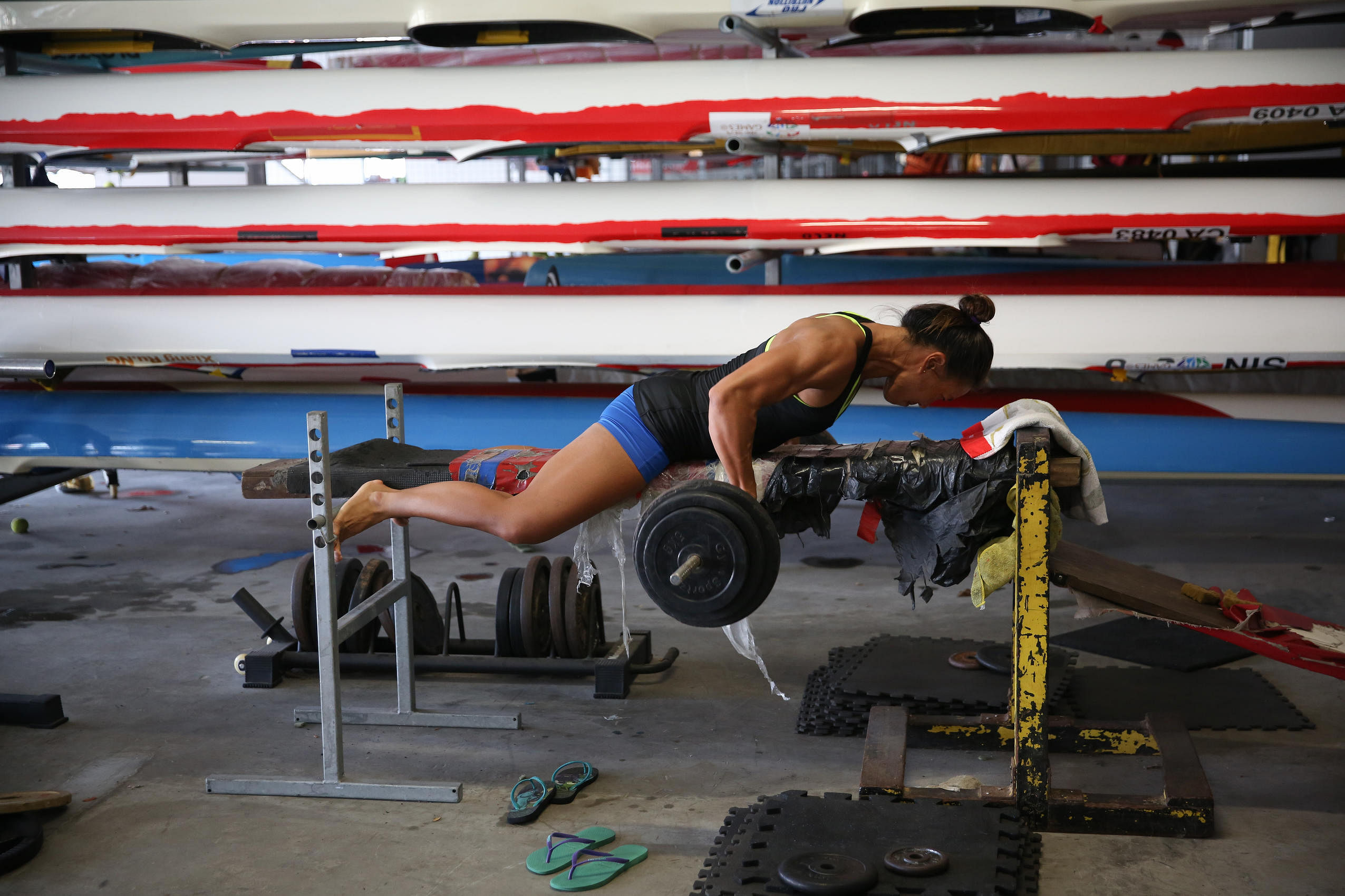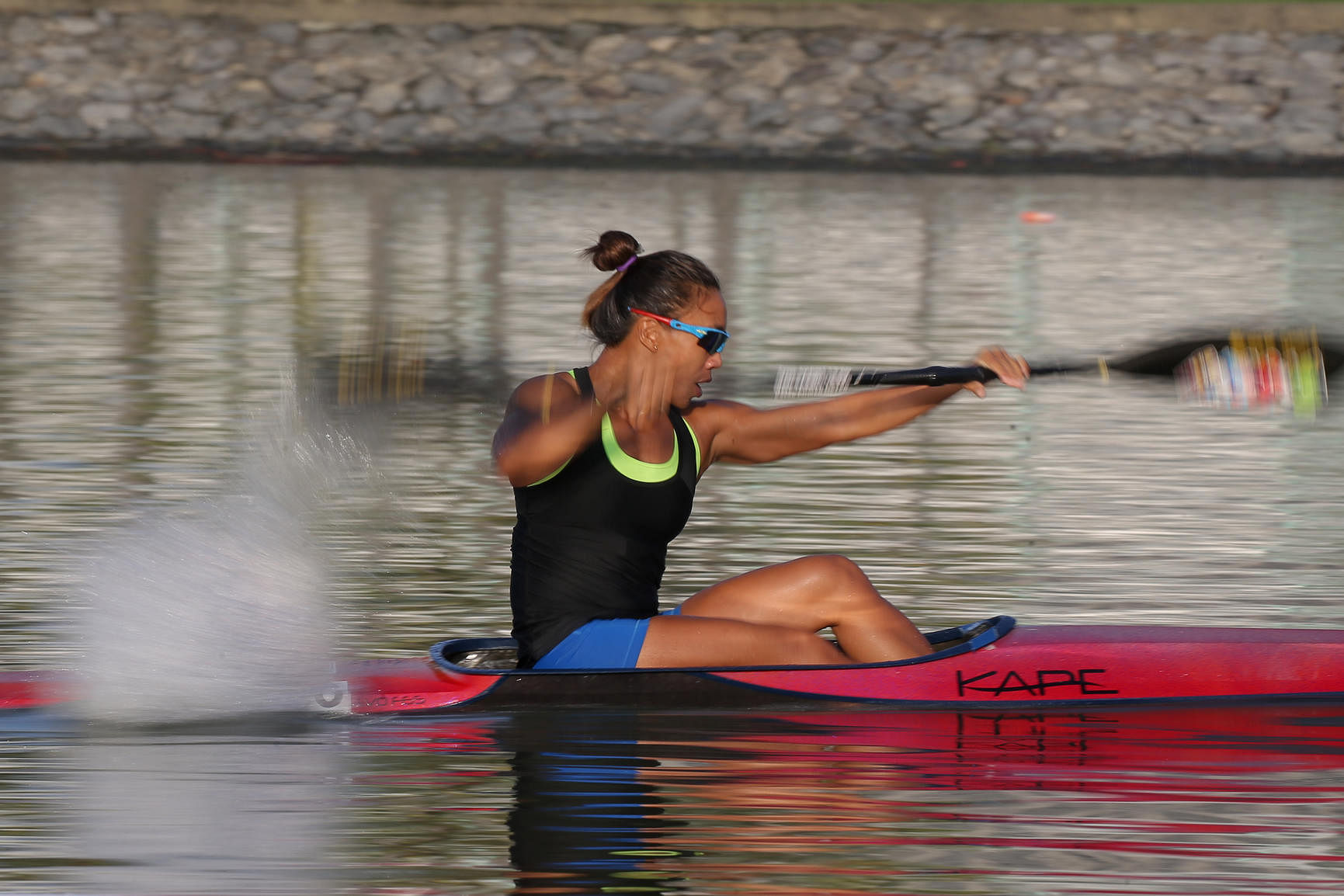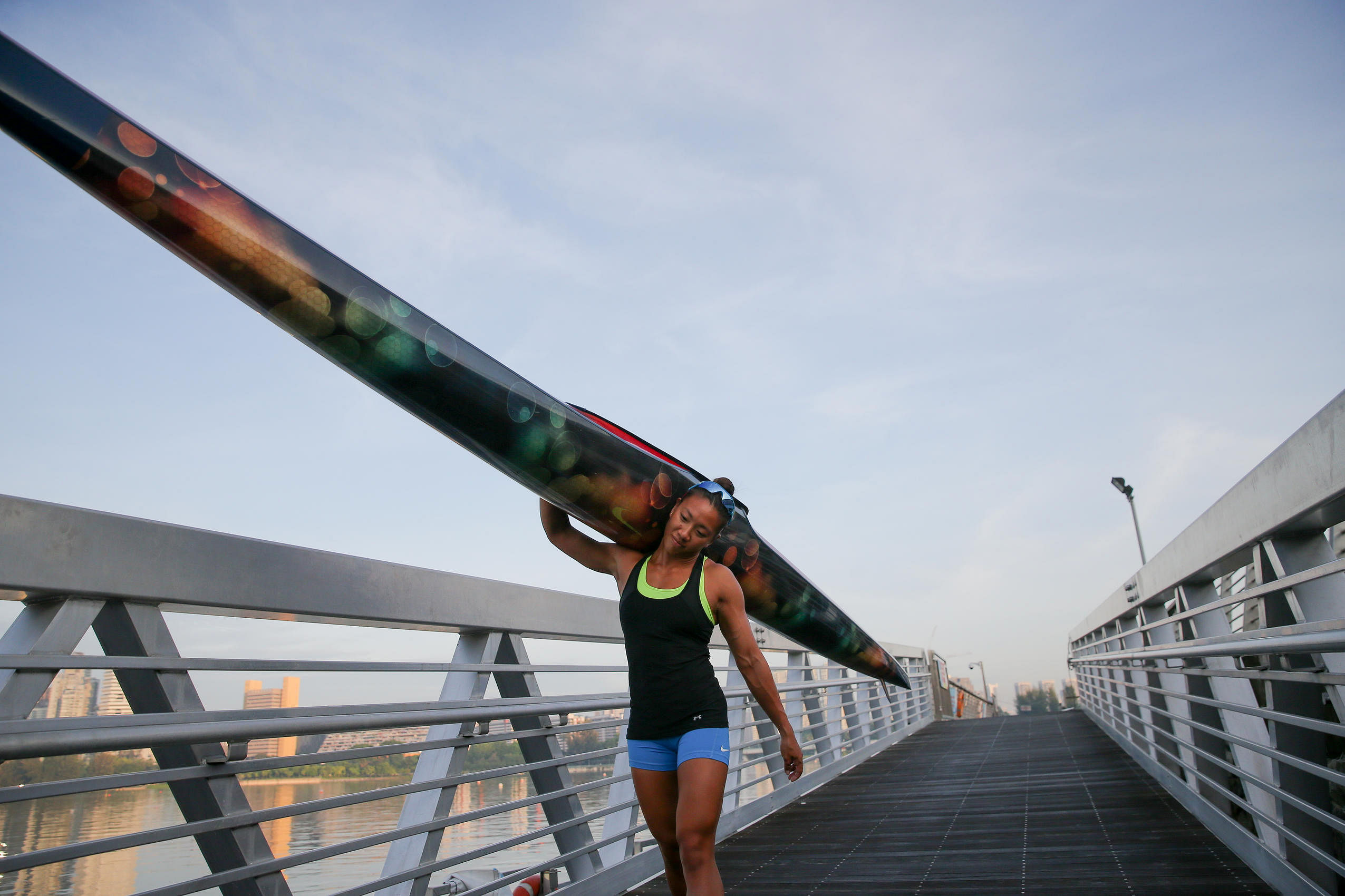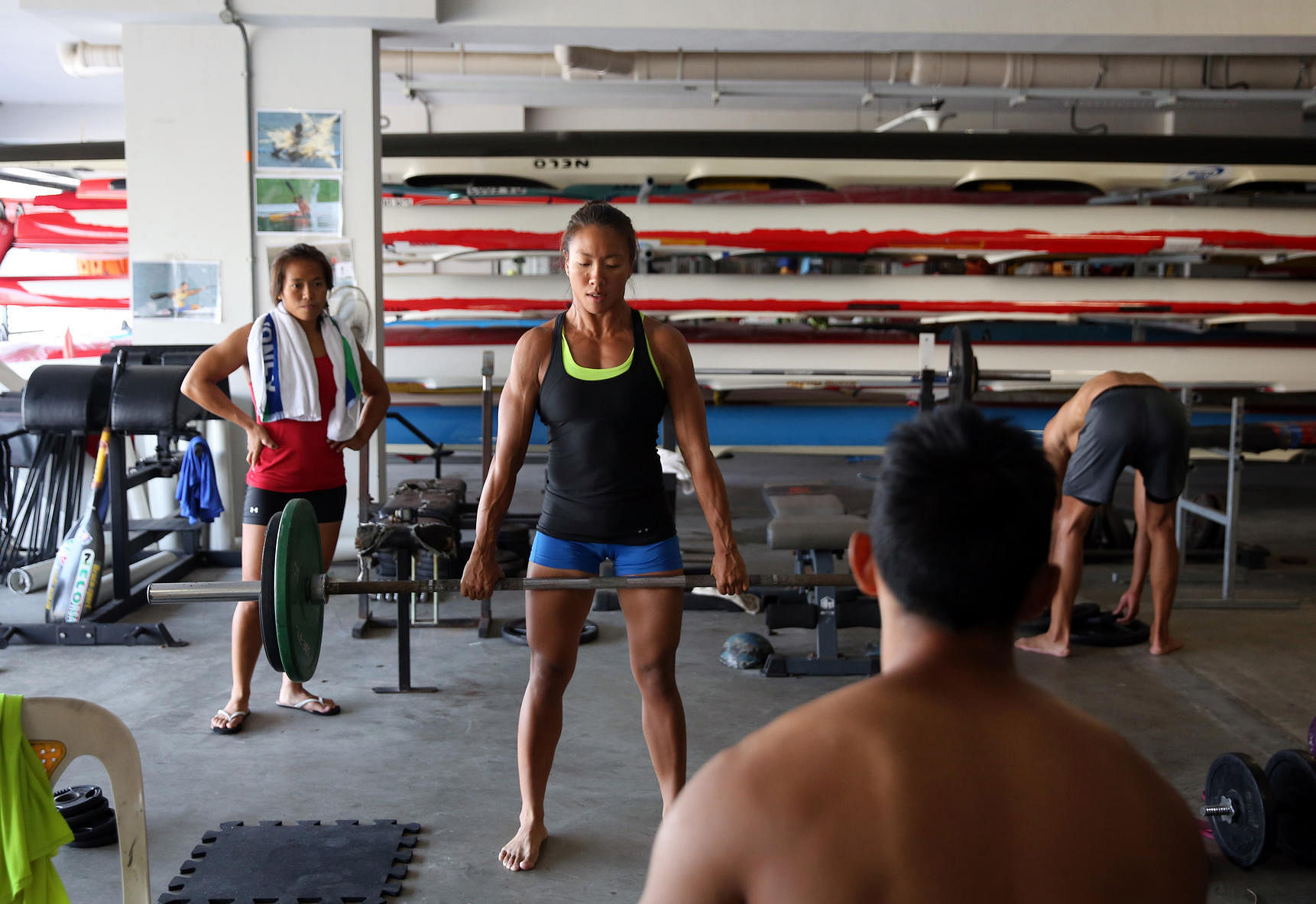"Look at her arms," the dragon boat boys sometimes say when she's on the water. "Did you see her biceps?", passers-by sometimes remark on land. Their tone is laced with envy and awe and perhaps also a derision that derives from some primitive male notion that her arms are unfeminine.
They're not. Go, look at them. They're strong, and beautiful, and built from struggle and toil, and speak of devotion, and more importantly help drive Stephenie Chen's craft through the water like a silent arrow. She's a vest-wearing, dark glasses-donning racer who is proof that the kayak, which apparently means "man-boat" in Eskimo, should be renamed.
Chen, 26, with eight SEA Games medals (five gold), used to get irritated by these comments, but now she's too busy trying to be better. Too busy lifting weights this morning. Too busy straining and hauling till sweat starts a slow drip. She's deaf to everything right now but effort.

She dead-lifts 60kg. Six reps. She does sit-ups while holding a 20kg weight in her outstretched arms. Six reps. She bench-presses 70kg. Six reps. She lies face down on the bench and pulls 70kg towards herself. Six reps. As she repeats this cycle six times it's a privilege to be here, to see this woman use iron to shape her body into an athletic instrument. This is not a mere gym, this is her room of transformation.
In some sort of medieval torture ritual she wraps a belt and chain around her waist, hangs a 10kg weight from it, uses a piece of sponge to grip the bar and does pull-ups. Her muscles stand out like strands in a rope and she grins. No, wait, it's a grimace. "It's the most painful thing," she says. "I hate pull-ups". At one point, tired, hurting, she stops. Then she resumes. Every set has to be finished. No one is watching or counting. But she is.
The weight room, which the team uses, is really a space in the boat shed at the Sports Hub which looks out into the shimmering water. A Singapore flag hangs in the background and someone unimpressed with their medals has left them draped in a corner. Occasionally an inquisitive citizen wandering down the waterfront peeks in, but otherwise no one knows they are here. Dreams are always a private business.
The athlete's life is an imitation game. Repeat, repeat, repeat. To watch them at work may theoretically seem boring but in fact to sit and watch Chen is to admire the mix of piety, discipline, ardour and sincerity that athletes bring to training. Every morning, commitment. Every morning, pain.
Practice might be tedious, but it's an act of faith. Faith that one day when an Asian Games medal, or an Olympic place -- all parts of her ambition --- is on the line, then every repetition will matter. Faith that if she is a devoted servant to her art then the elusive harmony she chases between muscle, mind, boat, water, will be found on the day she wants it.
So she lifts.
Then from beneath the weights an unbeatable rival emerges. A cockroach. They shriek and laugh and scatter till a muscled kayaker carries the intruder out alive.
Iron clanks again.

No one knows the dawn better than athletes. Kayakers wake in the darkness and then their boats slip out into the light.
Chen arrives, fittingly for an athlete, just as a new day shows itself. It's around 7am and she says: "I don't think anyone likes coming to practice, but you just have to do it".
Out there on the water the city is quiet as the morning light drapes tall, glass buildings and the Singapore Flyer but she's not looking. "It makes for good pictures," she explains, "but we don't see the surroundings". She's blind to everything but the smooth, burning beauty of kayaking. Passing dragon boats create a wash, like a series of ripples in a liquid carpet, and the kayakers have to wait for stillness before they race. They have to share space and it's a bit like Joseph Schooling training in a public pool.
I'm with national coach Balazs Babella in a motor boat chugging beside the kayakers who in full flow rip the water like a knife through paper. They sit upright, plugged into a slim sheath of a boat, legs together and almost half-hidden, their balance extraordinary. Once, laughs Babella, they invited athletes from other sports to try their art. "Not one could leave the pontoon and do one stroke. They just capsized".
Only from close up does their art form emerge. Their paddles windmill furiously but they obscure the importance of their driving feet and the back, shoulders, chest, torso working in concert. "The key is connection," Chen says. "The whole body must move together and be in harmony with the boat." Paddles dip in and flash out but they're not quite pulling the water; as Babella explains, the secret is to catch the water with the paddle and then let the boat move towards the paddle. Like any sport, strength without technique is an incomplete marriage here.
Chen starts with an individual time trial against two other women, a 200m sprint at 100 per cent, all of them bent over at the finish, as if depleted by their endeavour. Later, she'll twice do a 500m sprint but now she's part of a quartet in one boat, all of them working like a four-stroke engine whose pistons work in unison. When they're done they sit sprawled and spent on a pontoon and I foolishly say "it looks painful" and they laugh: "No, not at all".
Kayakers can write you treatises on pain and memoirs on screaming muscles, for they're always testing physical limits. They suffer in weight rooms on land so that they can suffer longer in water. "Pain comes in flashes," says Chen, "and in the end like a wave. I have seen people throwing up but the pleasure is in pushing through".
So what do you think at the end of a race?
"At the end there's no feeling. If you're thinking it means you didn't give 100 per cent".

It's past 9am when Chen and her team-mates, roughened by the sun, return to land, overturn their boat, empty water from it, carry it to the shed. Now they'll lift weights till around 11am, not necessarily because of love but purpose. These are athletes imprisoned by their goals.
Chen has been kayaking for almost 3,000 days, all those early mornings and aches in the hope of one great day. It will come, won't it? No one knows for certain, but it's this tireless search which is stirring. This taxi driver's daughter, with her strong hands on iron, chasing glory in this shed of no cheering.



